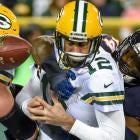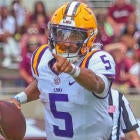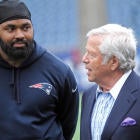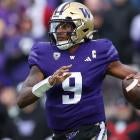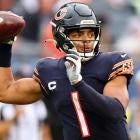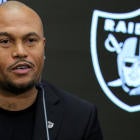Trying to stop Aaron Rodgers is almost an exercise in futility. It's like trying to kill a dragon. One way or another, the dragon is going to burn his foes alive and eat them for lunch. Throughout Rodgers' illustrious Packers career, that lunch has often been a pack of Bears.
The Chicago Bears, one of the most storied franchises in NFL history, have been reduced to a pile of rubble ever since Rodgers replaced Brett Favre. Since Rodgers took over in 2008, the Bears have finished ahead of the Packers in the NFC North just twice. The first instance was Rodgers' first season as the starter and the second was 2010 -- when the Packers still made the playoffs as a wild-card team and ended up beating the Bears in the NFC title game en route to a championship. In Rodgers' career, he's 14-4 against the Bears, throwing 38 touchdowns and nine interceptions for a 105.7 passer rating.
That's why it should as no surprise to hear that Ryan Pace, ever since he became general manager of the Bears in 2015, has committed countless resources to building a defense that can stop -- or at the very least, slow down -- Rodgers. That rebuild is on the verge of completion.
In 2014, the Bears' defense finished 30th in yards surrendered, 31st in point allowed, and 28th in DVOA. In 2016, they ranked 15th in yards surrendered, 24th in points, and 23rd in DVOA. So no, they're not there yet, but they're getting closer.
(The Bears are back at training camp! Don't MISS anything as they prepare to try and make the playoffs -- take five seconds to Sign up for our Free Bears newsletter now!)
Still, Pace deserves credit. He's building a defense that is almost ready to slay Rodgers.
Attack Rodgers
It starts up front. How do you beat the best quarterbacks in the league? You hit them. Over and over and over and over again.
Pace hasn't just turned the Bears' offensive front into a strength, he's turned the defensive front into a menace. When the Bears open up the season, they'll likely trot out a defensive lineup that includes the following players, most of whom arrived after Pace did in 2015:
- Defensive end Akiem Hicks
- Defensive tackle Eddie Goldman
- Defensive end Jaye Howard
- Outside linebacker Pernell McPhee
- Outside linebacker Willie Young
- Outside linebacker Lamarr Houston
- Outside linebacker Leonard Floyd
That's a long list, and that's entirely the point. The Bears might not have a Von Miller or a Khalil Mack or a Vic Beasley residing on their roster, but what they do have is an incredible amount of depth. And all of those players are capable, even if they aren't household names.
Hicks, who signed with the Bears last year after spending the first four years of his career with the Saints and Patriots, registered seven sacks last year. According to Pro Football Focus, he was the ninth-most productive pass rusher among all 3-4 defensive ends, recording 32 hurries and nine hits.
Goldman was the Bears' second-round pick in 2015. To this point, he has more promise than actual production, as injuries have limited him to 21 games in two seasons. But about that promise: he has a ton of it. In 2015, when he played in 15 games, he racked up 4.5 sacks and ranked as PFF's ninth-most productive pass rusher among all defensive tackles who played in at least 25 percent of their team's snaps. In six games last year, he still managed to reach 2.5 sacks. The Bears desperately need Goldman to stay healthy because when he is on the field, he's a terror.
Howard is a newcomer, but he made for a great offseason addition when the Bears signed him in May to a cheap one-year deal. If healthy, Howard can be a solid contributor, evidenced by his 5.5-sack season with the Chiefs in 2015. Staying healthy is a bit of problem, though. But for that cost, Pace got great value so late in the offseason.
That wraps up the defensive line. The linebackers are an even more impressive group.
McPhee is the best pass-rusher many have never heard of. In his first two seasons in Chicago, he had 10 sacks in 23 games. At this point, only injuries can slow him down -- but they have, unfortunately. Once again, McPhee is starting training camp on the PUP list with a knee issue.
Here's what he can do when he's healthy: In 2015, he was PFF's most productive pass rusher among all 3-4 outside linebackers. Yes, that means he was more productive than Justin Houston and Von Miller, who finished second and third, respectively. During that season, he accumulated six sacks, 12 hits and 45 hurries.
But health is a problem. It's a good thing then that the Bears also have Young, who has 24 sacks in the past three years with the Bears. Plus, he has the best sack dance in all of football:
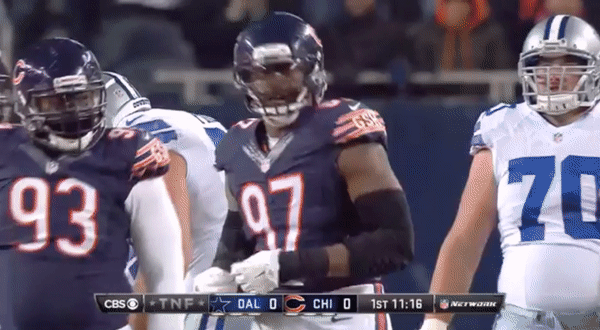
As for Houston, he went from an eight-sack 2015 season to a zero-sack 2016 season that was cut short due to his second torn ACL in a three-year span. At this point, expecting him to be a key contributor is asking too much. But asking him to be a solid depth piece? That's a perfect role for him.
Lastly but most importantly, the Bears have Floyd, who they took with the No. 9 pick in last year's draft. He was a stud in his rookie year, despite the fact that he was so underweight the Bears made him follow a diet that involved eating pretty much anything he wanted so long as he did it often.
"I've got prompts set up on my phone of times in the day that I'm supposed to eat, making sure I eat at those time when I get the alarm," Floyd said last summer, per CSN Chicago.
He finished his rookie season with seven sacks in 12 games. He was PFF's 11th most productive pass rusher among 3-4 outside linebackers. He managed to do this to Rodgers, providing a rare bright spot in a loss to the Packers:
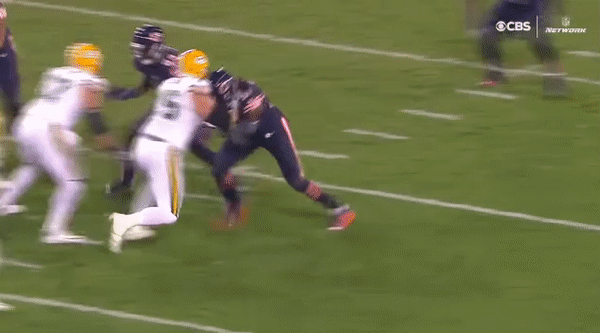
Rodgers is going to be seeing plenty more of Floyd in the wars to come. He should continue to improve considering he'll get heavier and stronger, and he now has a year's worth of experience in his mind. If you watched Bears games last year, you probably noticed that Floyd let multiple sacks slip away. He said he worked on his tackling form this offseason -- mostly because his poor form led to multiple concussions.
"I've been doing a real, real good job of working on keeping my head up," Floyd said, per the Chicago Tribune. "I really have no worries at all about it. I've been watching myself on film, really studying the way I tackle. It's really second nature now."
And he's put on 25 pounds, as the Chicago Sun-Times reported.
As a team, the Bears finished last year with 37 sacks -- the 12th highest total in football.
So clearly, the Bears have the soldiers to attack Rodgers. The only bad news? Rodgers led the league last year with a 93.8 passer rating when under pressure, according to PFF. But Rodgers was only under pressure on 30.3 percent of his dropbacks, which ranked 20th. And, of course, it's worth noting that his 93.8 passer rating under pressure is light years lower than his total passer rating of 104.2.
A 93.8 passer rating would've ranked 12th last year. It basically turns him into Ryan Tannehill. Rodgers' 104.2 passer rating was the fourth-highest in football. The point being, Rodgers -- like every quarterback -- is negatively impacted by pressure. His decline under duress might not be as substantial as other quarterbacks, but it still turns a superstar quarterback into a slightly above average one.
Keep in mind that the Packers' weakness on offense is their reliance on isolation routes. As we've seen in the past couple of seasons, their receivers have struggled getting open quickly. Martellus Bennett will obviously help negate that weakness -- he doesn't need to gain separation to be considered open -- but the Packers' receivers outside of Bennett and Jordy Nelson remain a question mark. That'll help the Bears defense for obvious reasons, especially considering they're lacking top-notch cover corners.
Furthermore, the Packers' reluctance to run the ball -- they attempted the fourth-fewest runs last year -- will aid the Bears' pass-rushers, who won't have to worry about committing to the run. They can attack the line of scrimmage without the fear of getting burned on the ground.
We all know how deadly Rodgers is when he can extend a play by eluding pass rushers and escaping the pocket. The best way to prevent him from doing that? Bringing him down in a hurry.
Look, to be clear, there's no real guaranteed way to stop Rodgers. He's the most gifted quarterback in the game. He makes impossible throws that can beat perfect defenses. Even if a team generates enough pressure on him, that alone doesn't guarantee success. But the Bears, at the very least, are in a position to make his life a living hell when they face him.
At some point, if you hit someone enough, they'll break. It's biology.
The inside linebackers
Not too long ago, the Bears' undeniable strength of their defense was their linebackers, with Brian Urlacher and Lance Briggs leading the way. Then Urlacher and Briggs got old, and the Bears were caught without a succession plan. That's one reason why the previous Bears regime -- GM Phil Emery and coach Marc Trestman -- were fired after the 2014 season.
Pace fixed that almost immediately by signing Danny Trevathan and Jerrell Freeman to fill the two inside linebacker spots in the Bears' 3-4 defense. Freeman is the star.
Jerrell Freeman has gone from afterthought, to elite pic.twitter.com/BabXVifLtW
— Pro Football Focus (@PFF) July 18, 2017
Some PFF stats about Freeman's 2016 season:
- He was the third-highest graded inside linebacker in football, behind Bobby Wagner and Luke Kuechly.
- As a run defender, he missed three tackles all season long. Three!
- He forced a stop on 11.8 percent of his run defense snaps -- the second best percentage among inside linebackers.
- He was the 11th most productive pass rusher at his position.
- He was the fourth most efficient tackler at his position.
Freeman is a top-five inside linebacker in the NFL. His partner at the position isn't, but Trevathan's still a dependable player. With the Broncos in 2015, he was PFF's fifth-highest graded inside linebacker, but he suffered a down year in his first season in Chicago.
The Bears need Trevathan to perform like he did in Denver. Maybe this will help:
#Bears LB Danny Trevathan admits he partied two much after winning the Super Bowl in Denver, which impacted his play negatively last year.
— Zach Zaidman (@ZachZaidman) July 27, 2017
With Freeman patrolling the running lanes and Trevathan defending the passing game, the Bears could have one of the most formidable inside linebacker duos in football. A cover guy like Trevathan will take on even more importance when the Bears play the Packers considering they'll now have to go up against Martellus Bennett, one of the most productive tight ends in the game.
Low-cost, high-potential players in the secondary
That doesn't mean the Bears aren't without their weaknesses on defense. The secondary is a glaring hole, and it's probably going to be the reason why the Bears fail to make the leap from a promising defense to a great one. They're probably still an offseason away from fixing the unit.
But Pace has done an admirable job patching up the leaky secondary with short-term fixes. He did that by signing cheap players like Prince Amukamara and Quintin Demps. Adrian Amos has flashed enough potential to be considered a potential starter moving forward.
Adrian Amos was one of the lone bright spots in the Bears secondary a season ago pic.twitter.com/7mDfz2aOwu
— Pro Football Focus (@PFF) July 8, 2017
The key to the secondary's success might be Kyle Fuller, a former first-round pick of the Emery era. After a blistering start to his career (three picks in his first three games), he's bottomed out. He disappointed in his second season and missed all of last year with an injury.
I wouldn't bet on his resurgence. I wouldn't bet on the Bears' secondary. Due to the secondary, the Bears defense is most likely a year away from being a legitimate threat to Rodgers.
Pace can't fix everyting all at once.
The right coaches
The good news in the long term is that the Bears have the coaches to bring along the defense. No one will argue that John Fox is an offensive or clock-management mastermind, but he has a history of defensive success. In his 15 years as a head coach, his defense has ranked in the top 10 in points allowed six different times.
But more important to the Bears is defensive coordinator -- and mastermind -- Vic Fangio, who shouldn't even be in Chicago. After the 49ers ran Jim Harbaugh out of town, they passed on hiring Fangio, who had been their defensive coordinator for four seasons, and promoted their defensive line coach, Jim Tomsula. Remember him?
DANCE TOMSULA DANCE pic.twitter.com/iA8YhbOgcp
— Pete Blackburn (@PeteBlackburn) September 15, 2015
They should've hired Fangio, who coached a top-10 defense in terms of both yards and points allowed in all four of his seasons in San Francisco. He's a wizard.
That's why the Bears need to keep him around after this year. Fangio's contract expires after the season, but the Bears can't afford to let him walk. Their dominant defense is just beginning to take shape. It probably won't happen this year with that secondary, but they're an offseason away. Pace needs to make sure Fangio is there to see the process through.
Rodgers and the Packers aren't going away anytime soon. To stop him, the Bears will need to bring back the Monsters of the Midway. Luckily, they have the coaches and the personnel in place to do so.
Winter -- and House Halas -- is coming for Rodgers, who has pulled more than a few Red Weddings on the Bears. And if there's one thing "Game of Thrones" has taught us, it's that The North remembers.
GAME OF THRONES HYPE the @ChicagoBears way #HouseHalas #GameOfThrones pic.twitter.com/zQynBs23Sk
— Krupa Patel (@krups54) July 16, 2017













